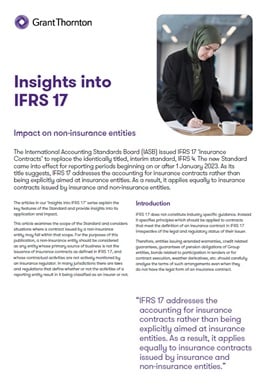-
Supply Chain and Operation Services
An optimised and resilient supply chain is essential for success in an ever-evolving business landscape
-
Business risk services
The relationship between a company and its auditor has changed. Organisations must understand and manage risk and seek an appropriate balance between risk and opportunities.
-
Marketing and Client Service
We offer strategy, client service, digital and insight solutions to businesses that are shaping the future across the Middle East.
-
Forensic services
At Grant Thornton, we have a wealth of knowledge in forensic services and can support you with issues such as dispute resolution, fraud and insurance claims.
-
Transaction Advisory
Globalisation and company growth ambitions are driving an increase in transactions activity worldwide. We work with entrepreneurial businesses in the mid-market to help them assess the true commercial potential of their planned acquisition and understand how the purchase might serve their longer-term strategic goals.
-
Growth services
We have designed and developed growth services to support your business at each phase of its growth. So whether you are an SME that has just set up or a large business wishing to expand, at Grant Thornton we will help you unlock your potential for growth.

-
IFRS
At Grant Thornton, our IFRS advisers can help you navigate the complexity of financial reporting.
-
Audit quality monitoring
Having a robust process of quality control is one of the most effective ways to guarantee we deliver high-quality services to our clients.
-
Global audit technology
We apply our global audit methodology through an integrated set of software tools known as the Voyager suite.
IFRS 17 does not constitute industry specific guidance. Instead it specifies principles which should be applied to contracts that meet the definition of an insurance contract in IFRS 17 irrespective of the legal and regulatory status of their issuer. Therefore, entities issuing extended warranties, credit related guarantees, guarantees of pension obligations of Group entities, bonds related to participation in tenders or for contract execution, weather derivatives, etc. should carefully analyse the terms of such arrangements even when they do not have the legal form of an insurance contract.
The significance of IFRS 17’s scope for non-insurance entities IFRS 17’s definition of an insurance contract and its scope have not changed significantly from what was set out in IFRS 4, which might lead non-insurance entities into thinking they need not concern themselves with this Standard.
IFRS 4 had allowed entities issuing insurance contracts to carry on accounting for them using policies that had been developed under their previous local accounting standards. This meant that entities have continued to use a multitude of different approaches for accounting for insurance contracts, making it difficult for the users of financial statements to compare and contrast the financial performance of similar reporting entities. This is not the case under IFRS 17, which goes much further to solve the comparison problems created by IFRS 4 by requiring all insurance contracts to be accounted for in a consistent manner. Specifically, the Standard requires entities to use a current measurement model for their insurance liabilities, using updated information for risks and obligations. As with all principles-based standards, there are still differences in methods that may be applied, such as determining discount rates or risk adjustments. However this is still a significant improvement over the requirements of IFRS 4.
Non-insurance entities that had previously applied IFRS 4 were able to apply their existing accounting policies to insurance contracts that fell within the scope of that Standard. However when applying IFRS 17 they can only apply accounting policies that are permissible under IFRS 17 for any reporting period that begins on or after 1 January 2023. Non-insurance entities need to be alert to the possibility that contracts they have issued (or may issue in the future) might now fall within the scope of the new Standard.
We share further insights in the PDF, which can be downloaded below.
